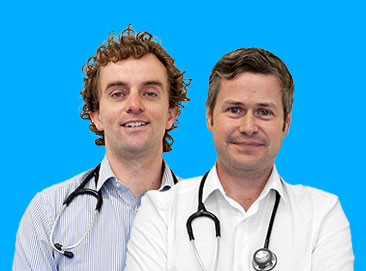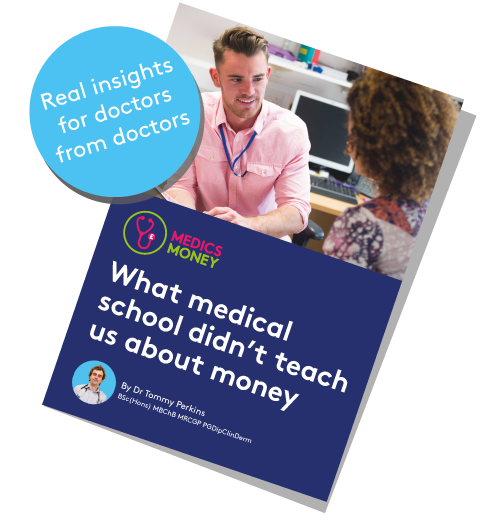The tax we all pay is the highest it’s been since the Second World War so it’s never been more important to make sure you pay the right amount of tax.
HMRC are not going to phone you up and help you utilise valuable allowance and tax planning opportunities. You have to proactively negotiate your tax bill. In this article Dr Ed Cantelo, who’s not only a doctor but also a chartered accountant and charted tax adviser tells us about tax planning for doctors in 2023 including outlining the changes.
Frozen tax allowances mean we’re all paying more tax
The tax-free personal allowance has been frozen at £12,570 for a number of years and this freeze has been continued until April 2028. This is part of the Government’s plan to use what is known as “fiscal drag” to generate more tax revenue. It is thought that 3.2 million more people will start paying income tax as their incomes exceed the frozen personal allowances.
In England, Wales and Northern Ireland, the higher rate threshold has been frozen at £50,270 resulting in a further 2.1 million taxpayers paying tax at 40% by the time the freeze ends.
What tax planning can doctors do about this
Make sure you maximise your claim for employment expenses. You can claim for your professional subscriptions such as your GMC fee, Royal college fees, BMA fees (if applicable) and so on. You can also claim your CCT fee and your examination fees if the exam is mandatory under a junior doctor training contract with a Royal College. You can make a claim for the current tax year and the past four tax years and if you haven’t made a claim before we would encourage you to do so to reduce your tax bill.
More people will pay 45% tax
The additional higher rate tax threshold, at which taxpayers pay 45% income tax has now been reduced from £150,000 to £125,140 which means more taxpayers will be paying tax at the highest rate.
What tax planning can doctors do about this
At this higher level of income, it might be worth considering if there is a way to use a company in your tax arrangements. This only really fits for those people with additional sources of income such as private practice, but is something to consider – though you would need to think very carefully and get professional advice. You can find out more information here.
Don’t forget to consider your marginal tax rate between £100,000 and £125,140 – between these amounts your marginal tax rate is 60% for income tax and higher in Scotland. Learn more about marginal tax rates here.
Doctors pay more tax in Scotland
In Scotland, the changes above apply but as our Scottish readers will be aware there are more income tax bands. The two highest rates of income tax in Scotland have been increased from 41% to 42% and from 46% to 47%, these changes having been announced by the Scottish Government in February this year.
Don’t get stung by dividend tax changes
These rates above apply to non-savings income such as employment income or profits from self-employment. There is a separate tax regime for dividends, and this has also changed. Firstly, everyone gets a tax-free dividend allowance, so the first chunk of dividends is not taxed, or rather is taxed at 0%. This was £2,000 but has been cut to £1,000 this tax year and will go down to £500 in the next tax year. So, the first £1,000 of dividends is basically tax free in the 2023/24 tax year – down from £2,000 – meaning around 635,000 people will start paying tax on dividends. This will go up to over a million when the allowance gets cut again. The rates at which dividends are taxed were increased last year by 1.25% across the board by the Health and Social Care Levy which was ultimately scrapped but the increased dividend rates were kept. These dividend tax rates are 8.75% for basic rate taxpayers, 33.75% for Higher rate taxpayers and 39.35% for Additional rate taxpayers.
What tax planning can doctors do about this?
Use ISAs where you can as these provide a wrapper against income tax. So, if there is a company you want to buy shares in, can you use a Stocks and Shares ISA instead of buying them personally?
Don’t get stung by Capital Gains Tax changes
Capital Gains Tax is payable on profits made on disposal of certain assets such as shares. This has not changed much but just as the tax-free dividend allowance has been reduced, so too has the Capital Gains Annual Exempt Amount which is a kind of personal allowance for capital gains. This was £12,300 but has been cut to £6,000 for this new tax year and will go down to £3,000 in the 24/25 tax year. This means the Government will raise more Capital Gains Tax revenue. It is thought that this, as well as the reduced tax-free dividend allowance, will create new admin burdens for both taxpayers and HMRC as more people have to file tax returns for relatively small amounts of dividends or capital gains.
What tax planning can doctors do about this?
The growth in value of any shares in an ISA is exempt from Capital Gains Tax so again, if you want to buy shares, can you do that via an ISA? Also if you know that you have to or want to sell an asset bear in mind that £6,000 of gains is tax free this tax year compared to £3,000 next tax year.
Pension tax changes – some good news but only if you use it
The recent budget in March made some significant changes to the pension regime including the surprise scrapping of the Lifetime Allowance and increasing the Annual Allowance from £40,000 to £60,000. This will reduce the number of people who receive an annual allowance charge.
What tax planning can doctors do about this?
This YouTube video explains more and this blog article covers what you can do to maximise this benefit.
Limited companies pay more tax
A long-trailed increase in the Corporation Tax rate has finally come to pass as of 1 April 2023. Note that Companies have a slightly different tax year to individuals. The main rate of corporation tax rate has now gone up from 19% to 25% despite significant pressure on the Government to back down on this increase. Companies with profits below £50,000 will still pay 19% corporation tax, those with profits above £250,000 will pay 25% and if you fall in between there is a tapered rate which effectively leads to a marginal tax rate of 26.5% when you run the numbers. This YouTube video explains more about this.
The super-deduction regime that we have talked about in the past has now ended and has been replaced with a new scheme called ‘full expensing’ – this basically means that if a company buys qualifying assets, they can get a 100% deduction of the cost of the asset from their profits. If a company is paying 25% corporation tax, then buying a £100 qualifying asset would result in a £25 tax saving.
This will last for three years, to 31 March 2026, although the Government indicated that it is their ambition to make this permanent.
Make sure you claim all qualifying expenses through the company, and consider if you need to purchase any assets for your business.
Join 30,000 doctors and receive free, exclusive, financial CPD for doctors in your inbox.
Medics’ Money is run by doctors and finance experts, for doctors. Our free financial CPD gives you all the knowledge you need to take control of your finances.

️National Insurance changes
The tax year that has ended brought us several changes to National Insurance Contributions as different Chancellors changed rates and thresholds. Everything stays at it is for the 23/24 tax year but the primary threshold, which is basically like a personal allowance for National Insurance, is increased to £12,570 for any self-employed individuals including GP partners. In 2022/23 this was £11,909 because the government took the average of the different thresholds for the year which, as I said, had some changes. For employees, they just went straight ahead and increased the primary threshold to £12,570 from July 2022.
️What tax planning can doctors do about this?
This is a good thing! Don’t forget, you can also reduce Class 4 NIC via offsetting any losses, or by expensing any purchases that were ‘incurred for the purposes of the trade’ against your profits (GOV.UK, https://www.gov.uk/hmrc-internal-manuals/national-insurance-manual/nim24605). Make sure you pay the correct amount of National Insurance using this guide.
Tax doesn’t stop when you’re dead
It was announced in 2021 that Inheritance Tax (IHT) thresholds will be frozen until April 2026. Everyone has what is called a Nil Rate Band of £325,000 which means an inheritance tax rate of 0% on assets of up to £325,000. This includes what is called Chargeable Lifetime Transfers and assets on death.
What tax planning can doctors do about this
IHT is complicated but there are ways to minimise your IHT liabilities for example if you listen to our podcast episode 73 that covers an IHT efficient way to pay school fees.
Listen here.
Tax fee childcare changes – coming soon!
Tax free childcare won’t change just yet but from April 2024, for 38 weeks a year, 30 hours per week of free childcare will be offered to eligible working parents of children aged nine months to three years. Additional funding will also be given to providers of childcare to support the cost of delivering the existing free hours offered in England.
What tax planning can doctors do about this
If you are around the £100,000 mark with your adjusted net income, a term we’ve mentioned many times at Medics’ Money, consider if there are ways to bring yourself down below that threshold to ensure you still qualify for tax free childcare.
What medical school didn’t teach us about money
“What medical school didn’t teach us about money” will give doctors a step by step plan to transforming your financial future. Enter your details to download your copy now









